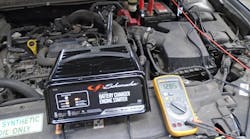The EPA is expected to propose regulation requiring an increase in Class 8 truck fuel economy up to 40 percent by 2027 compared to 2010 levels, while cutting greenhouse gas emissions. A typical tractor-trailer averaging 5 to 6 mpg of diesel today would need to average 9 mpg under such rules, which would continue the EPA’s regulation of heavy duty truck fuel economy that began in 2011.
Since the variable cost of fuel is usually one of the highest controllable fleet costs, reducing it has been a top concern for many trucking companies, made more urgent with EPA fuel economy requirements. Though previous gains in Class 8 mileage came largely from using more efficient tires or equipment, a new promising approach is to improve mileage with fuel additives.
While many in the trucking industry are justifiably skeptical of unsupported claims for fuel additives, some EPA-registered additives have not only been shown to boost mpg by more than 10 percent, but also reduce overall emissions by over 21 percent under highway conditions.
For instance, one EPA registered fuel additive, called Dynamo Cetane Booster by CyberFuels (www.cyberfuelsinc.com), a subsidiary of EncounterCare Solutions, has been tested by both trucking companies in the field and by an independent, third-party, EPA certified laboratory. This diesel fuel additive has been proven to comply with the federal low sulfur content requirements for use in diesel motor vehicles and non-road engines, contains no petroleum, and increases cetane by 8 points when added to regular diesel at fill up.
When John David Holmes, owner of JD Holmes Trucking based in Georgia, tested Dynamo Cetane Booster, his main concern was improving mileage and lowering fuel cost.
“There’s a lot of talk among truckers about EPA regulations, but most of us are more concerned with saving money on expenses and improving truck performance,” says Holmes.
In the past, Holmes had tried other additives but didn’t see a change, so he decided to road test the EPA registered fuel additive.
Holmes ran comparative mileage tests in 11 semi tractor-trailers, ranging from a 1998 C-15 Caterpillar 625hp engine to 2012 15x15 Cummings, including Peterbuilt 289hp and 387hp Cummings engines. These road tests were conducted over 12 weeks between April and June 2014, with fuel and mileage data gathered from the trucks’ onboard computers.
“As soon as I received the first shipment I added it to all 11 trucks in my fleet as a test,” says Holmes. “The first thing we noticed was that there was no smoke coming out of the trucks. More importantly, there was an almost immediate 10 percent increase in miles per gallon, plus a boost in power.”
During testing, each truck drove between 15,720-16,575 miles on average, with 195,480 total miles for all trucks.
“The average savings realized per truck tank at fill up was $128.71, and each truck saved an average of $0.32 per mile, which really adds up over time,” says Holmes.
According to Holmes, the savings was significant if you consider that total average savings per truck per 100,000 miles equates to $14,244.57, and the total savings for all 11 trucks per 100,000 miles would be $156,690.25.
“I can’t afford not to use Dynamo now that I know how it can increase mpg and performance,” says Holmes.
With the EPA targeting greenhouse gas emissions in Class 8 trucks and regulation like the California Air Resources Board’s restricting particulate matter, emission control is also vital for trucking fleets to handle. Toward this end, some EPA registered fuel additives are proving their worth.
For instance, Olson Ecologic Engine Testing Laboratories, an EPA certified laboratory headquartered in Fullerton, Calif., has independently tested and certified the results of Dynamo Cetane Booster for exhaust emissions.
Tests for reduction in Diesel Particulate Matter (DPM) were conducted on both heavy-duty Caterpillar engines as well as smaller F250 Ford diesel engines. The results show a 20 percent reduction in DPM under highway conditions.
For both long haul and short haul truckers, some EPA registered fuel additives are holding down maintenance costs, and have even reduced the frequency of regen. CyberFuels’ cetane boosting additive, for instance, cleans dirty injectors, prevents injector sticking in engines, and contains diesel lubricator for maximum fuel lubrication to protect pumps and injectors from accelerated wear.
Reduced DPM, such as the fuel additive provides, can help to prevent clogged DPF filters. This can minimize the potential of soot backing up into the engine, causing damage to the VGT actuator, turbo, fuel injectors, and EGR solenoid. It could also help to minimize the amount of unburned fuel injected in the exhaust system as part of the regeneration cycle, which might otherwise go into the crankcase contaminating the engine oil.
“Not only am I saving a ton of money from the fuel cost, I saved even more in maintenance costs. In the last five months using Dynamo my costs were only $9,800 compared to an average five-month cost of $16,200 before using Dynamo.” concludes Holmes.


